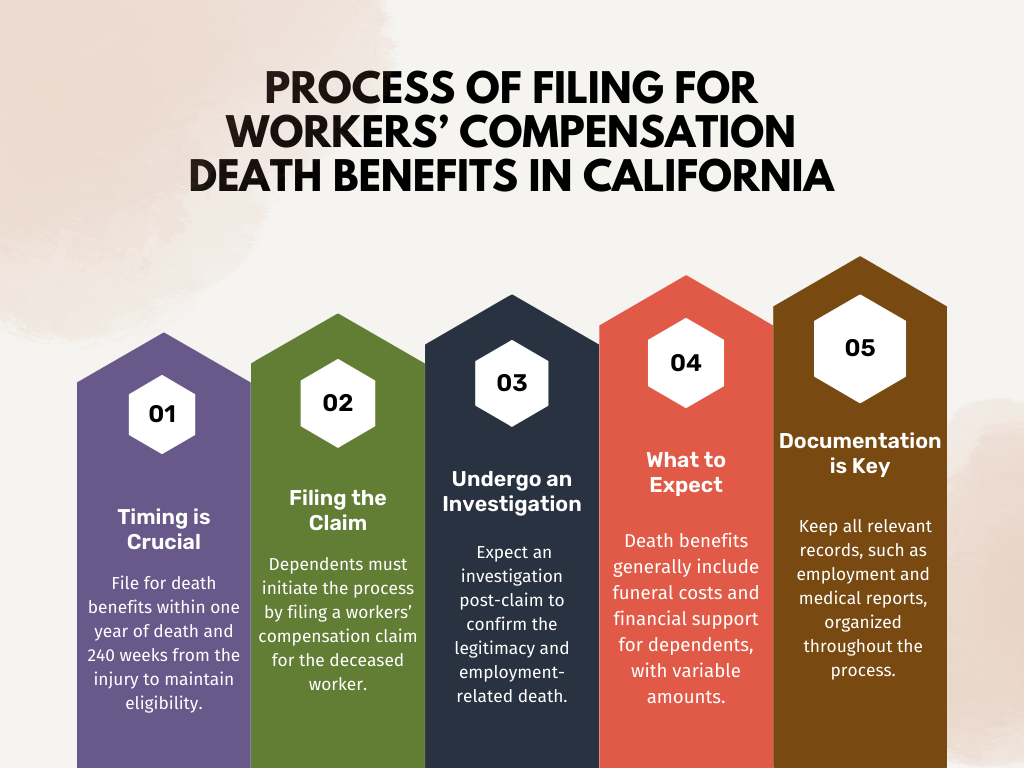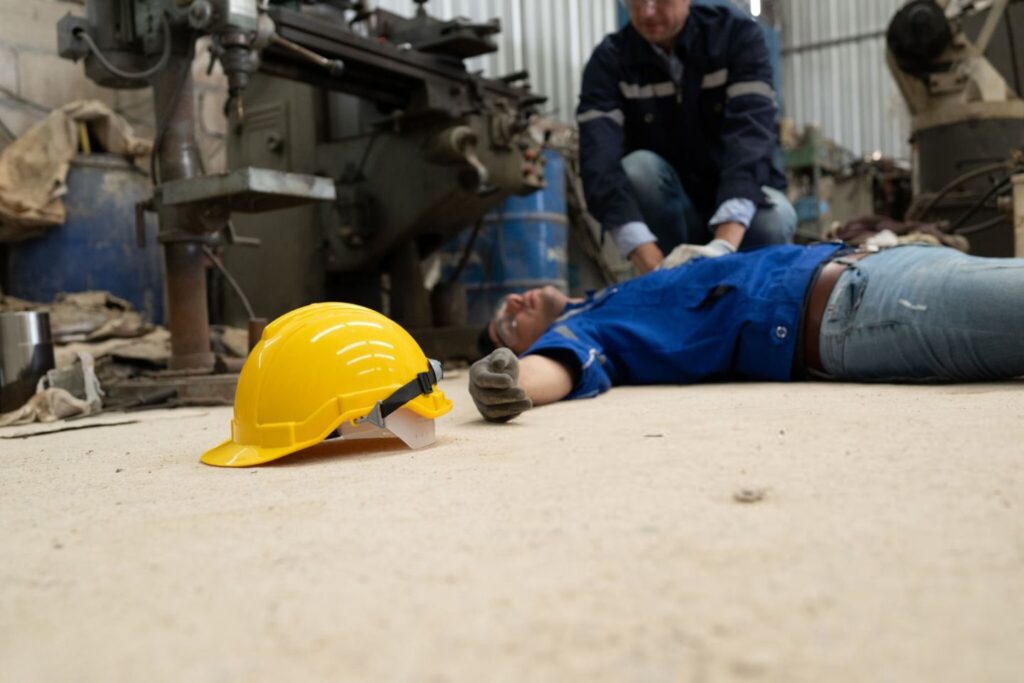According to data, workplace fatalities in California follow a concerning trend, highlighting the urgent need for improved safety standards and targeted efforts to protect the deceased’s families. For families who have lost a loved one due to a work-related injury or illness, California’s workers’ compensation system offers a financial lifeline of workers’ compensation death benefits. These benefits aim to support survivors by compensating for the financial contributions the deceased worker provided. Furthermore, employers or their insurance providers are also required to cover burial expenses.
This article aims to provide a comprehensive guide on workers’ compensation death benefits in California. It’ll explore the legal foundations of the system, offer insights into how it operates, and share practical tips for maximizing the benefits available.


- What Is Offered Under Workers' Compensation Death Benefits in California
- Eligibility and Amounts Under Workers’ Compensation Death Benefits in California
- Process of Filing For Workers’ Compensation Death Benefits in California
- Statute of Limitations and Workers Compensation Death Benefits
- Distribution of Workers’ Compensation Death Benefits in California
- Importance of Legal Representation for Workers’ Compensation Death Benefits In California
What Is Offered Under Workers’ Compensation Death Benefits in California


California workers’ compensation death benefits serve as a critical support system for families facing the untimely loss of a loved one due to a workplace accident or illness. Understanding these benefits is the first step toward securing the necessary financial and emotional relief during such challenging times.
Here’s a breakdown of the benefits offered under this system:
- Comprehensive Coverage for Various Incidents: Whether the loss results from a fall, vehicle accident, explosion, fire, or exposure to hazardous substances, workers’ compensation death benefits in California offer a safety net to the survivors of workers who die under such tragic circumstances.
- Support For Family: Surviving family members may be eligible for death benefits if they can prove the death was work-related. This may require medical opinions or substantial evidence, especially if the incident wasn’t witnessed.
- Financial Assistance for Funeral Expenses: The system provides up to $5,000 for funeral and burial expenses, helping relieve the financial burden of arranging a funeral for the deceased.
- Dependency Benefits: Death benefits extend financial support to dependents of the deceased worker, compensating for the lost income. This support varies based on the worker’s job classification, the number of dependents, and their level of dependency.
- Duration and Amount of Benefits: The amount and duration of the benefits depend on specific factors, including the deceased’s earnings and the family’s dependency status. Benefits aim to provide a stable financial foundation during the difficult period following the loss.
- Protection for Dependent Children and Spouses: Specifically designed to support the immediate family, these benefits ensure that minor children and spouses receive the financial support necessary to cope with the aftermath of a big loss.
- Broad Coverage Under Workers’ Compensation: This system ensures that families of workers who have a standard workers’ compensation insurance plan can find some ease in financial support after a work-related death.
At The Personal Injury Center, we know how hard it is to cope with the loss caused by such a tragedy. To support you during this tough time, we can connect you with local legal experts in your region. They’ll help you claim the compensation you deserve and guide you through the legal requirements smoothly.
Eligibility and Amounts Under Workers’ Compensation Death Benefits in California
When a worker passes away due to a work-related injury, their dependents may be entitled to death benefits. The amount and eligibility for these benefits vary based on the number of dependents and their level of dependency. Here’s a rundown of what this entails:
Eligibility Criteria
To qualify for workers’ compensation death benefits, you must have been financially dependent on the deceased worker at the time of their death. This includes household members or close relatives such as children (including adopted and stepchildren), spouses, grandchildren, parents, siblings (including in-laws), grandparents, aunts, uncles, nieces, and nephews.
Amount Based on Total Dependents
Total dependents are those who depended entirely on the deceased worker for financial support. This group specifically includes children under 18, adult children unable to work due to physical or mental challenges, and a surviving spouse who made $30,000 or less in the year before the worker’s passing. These individuals are recognized as fully reliant on the financial contributions of the deceased worker, highlighting the critical support role the worker played in their lives.
- One Total Dependent: Receives $250,000.
- Two Total Dependents: Share $290,000 equally.
- Three or More Total Dependents: Share $320,000 equally.
Provisions for Partial Dependents
Partial dependents are eligible for survivors’ benefits as well, though this applies only when there’s at most one total dependent. These partial dependents are individuals who partially relied on the deceased worker’s income for support, but they also had other sources of financial assistance.
- If there’s only one total dependent, partial dependents can still receive benefits. They share an amount that’s eight times their annual support from the deceased, up to $250,000.
- If there are no total dependents, partial dependents divide an amount equal to eight times the annual support they received, with a cap of $250,000.
- When one total dependent exists, they receive the full $250,000, while partial dependents share a pool of four times their annual support, not exceeding $290,000.
Proof of Dependency
Relatives and household members, excluding those automatically considered total dependents, must prove their total or partial dependency on the deceased worker. For instance, an elderly father could qualify if he lived with the deceased worker and was financially supported by them.
Process of Filing For Workers’ Compensation Death Benefits in California


Navigating the aftermath of losing a loved one to a work-related incident can be overwhelming. Understanding how to claim the workers’ compensation death benefits you’re entitled to is crucial. Here’s a simplified guide to help you through this process:
- Timing is Crucial: You must file a claim for death benefits within one year from the date of the worker’s death and within 240 weeks from the date of the injury that led to the death. This ensures your eligibility for the benefits remains intact.
- Filing the Claim: Being dependent on the deceased worker, you’ll need to file a workers’ compensation claim. This is the first step in initiating the process to receive the death benefits that are due to you.
- Undergo an Investigation: After filing your claim, be prepared to comply with an investigation. This is a standard procedure to verify the legitimacy of your claim and the connection between the worker’s death and their employment.
- What to Expect: Death benefits typically cover funeral expenses and provide financial support to the dependents. The exact amount and duration of these benefits can vary, depending on the worker’s employment and the dependents’ needs.
- Documentation is Key: Throughout the process, keep all relevant documentation organized. This includes the deceased worker’s employment records, medical reports related to the work-related injury or illness, and any previous communications regarding workers’ compensation.
If you’ve lost a family member to a workplace accident, The Personal Injury Centre is here to support you. We connect you with skilled lawyers who can assist you in securing the death benefits your family deserves, guiding you through this challenging period with compassion and expertise.
Statute of Limitations and Workers Compensation Death Benefits


When dealing with the loss of a loved one due to wrongful death in California, it’s crucial to be aware of the legal time frames for filing a claim. This includes special considerations for claims against government entities as well. Always consider seeking legal advice to ensure your rights are fully protected.
Here’s a straightforward guide:
- Standard Filing Deadline: You have two years from the date of your family member’s death to file a wrongful death claim. Missing this deadline can lead to the court dismissing your case as untimely, preventing your family from obtaining compensation.
- Consequences of Missing the Deadline: If a claim is filed after the statute of limitations expires, your family loses the chance to hold those responsible for your loved one’s death accountable and to recover compensation.
- Exceptions to the Rule: There are certain exceptions that may shorten or lengthen the time you have to file. To navigate these complexities, it’s advised to consult with a wrongful death attorney promptly.
- Special Case: Claims against government entities or agencies must be filed within six months following your loved one’s death. These claims can arise from various situations, including:
- Accidents on government property
- Incidents involving government vehicles
- Medical malpractice in public hospitals
- Any death caused by government employees during their duties.
- Government Claim Review Period: After filing a claim against a government entity, there is a 45-day period during which the claim can be accepted or denied. If the claim is denied or if there’s no response after 45 days, you must file a lawsuit within six months of the denial or the end of the review period.
Distribution of Workers’ Compensation Death Benefits in California
Death benefits provide financial support to dependents of workers who have died due to workplace injuries or illnesses. By distributing death benefits in regular installments, the system aims to provide a consistent and reliable source of financial aid to those left behind after a worker’s fatal injury, tailored to the needs of the dependents and according to the worker’s earnings. Here’s how it works:
- Payment Method: Unlike a one-time payment, death benefits are paid in weekly installments. This approach ensures that a steady stream of income supports the deceased worker’s dependents.
- Support for Dependent Children: Dependent children under 18 aren’t left without support if death benefits run their course. They’ll continue to receive survivors’ benefits at the temporary disability rate until they reach adulthood. For adult children who cannot support themselves due to mental or physical incapacities, these benefits extend for a lifetime.
- Calculation of Benefits: The amount of death benefits depends on two key factors:
- The date of the worker’s injury
- The total number of dependents
This ensures that the benefits are tailored to the specific needs of each family.
- Minimum Weekly Benefit: It’s also worth noting that death benefits have a floor amount, set at no less than $224 per week. This provision guarantees a minimum level of support, based on the worker’s average weekly earnings prior to passing.
Importance of Legal Representation for Workers’ Compensation Death Benefits In California


Losing a loved one is an incredibly tough experience, and the challenge of accessing workers’ compensation death benefits can add to the stress. Understanding and accessing these benefits, with the right guidance, can greatly ease the burden on families during such difficult times, ensuring they receive the support they need and deserve.
Here’s why getting the right guidance and assistance is crucial:
- Complex Laws: The factors involved in workers’ compensation laws, with its complicated rules affecting benefit amounts, can be overwhelming. Families often find it hard to understand how these laws apply to their situation and what benefits they’re entitled to.
- The Role of Legal Experts: Turning to legal specialists, can make a significant difference. These professionals provide essential advice regarding workers’ compensation death benefits in California, helping families understand their rights, smoothly navigate the claims process, and secure the maximum benefits the law allows.
- State Resources: Consulting with California’s workers’ compensation board is another key step. It offers clarity and detailed information on available benefits and the process for claiming them, helping families make informed decisions..
Navigating the complexities of workers’ death benefits can be daunting, especially during a time of loss. If you’re struggling to understand or claim these benefits, The Personal Injury Centre is here to help. We specialize in connecting you with local legal experts who are familiar with your situation and can guide you every step of the way.
Key Takeaways
|



